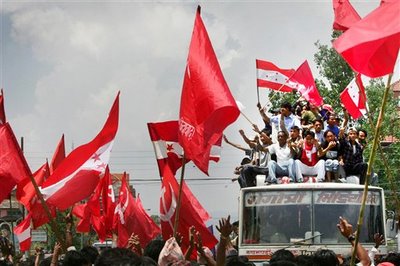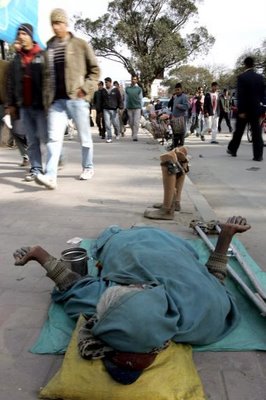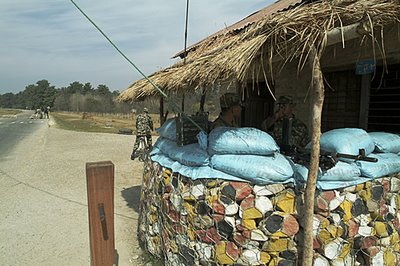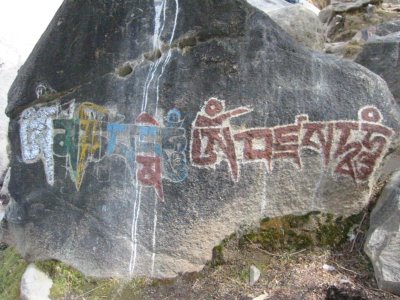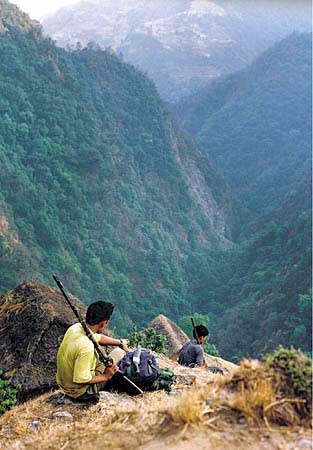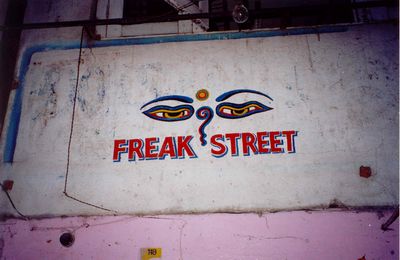Travel books say this is the worst time of year to go to Nepal. The U.S. State Dept. warns Americans not to come here. Predictably, I have been rewarded grandly for ignoring both.
As I mentioned in my first post about Nepal, I arrived here almost one month ago, at the beginning of June. I spent the first night in Butwal, which is a small town at the foot of the Mahabharat Range, just a few kilometers in. Looking back, it was nothing, but when I arrived there I was pretty enchanted with the vertical wall of green mountains rising just behind the town's last buildings. They sort of overlapped each other, like hands cupping some hidden goodie, and shot up high enough to be persistently carressed by clouds. This is the rainy season.
The next evening, after a really tough all-day ride in a bus on mildly terrifying mountain roads, I arrived in Kathmandu. It is always a strange and exhilarating experience, I think, to arrive after dark in a city in which one has never been before. As I mentioned in my first post about Nepal, the city was completely jammed with Maoist ralliers when we pulled in. 500,000 of them, according to the papers.
I eventually made it to a place to stay -- Freak Street. It used to be the place where all the counterculture Westerners came back in the 60's and 70's to run away and lose their minds, basically. It was dirt cheap then and is still about as cheap as it gets in Kathmandu. Quite the opposite from having turned into some awful faux-bohemian East Village situation, though, it has actually toned down so much that you almost have to look for signs of what it even used to be. It is almost exclusively occupied by locals now. You can see the old Freak Street in places like the Snowman Restaurant, though, a tiny graffiti-covered place that serves only pies and cakes, with the best rock music in the neighborhood, and which has been there since 1966. My small hotel looked out over a large open square that was always bustling with people, and across which was an area thick with very old temples and other buildings. A beautiful place.
Kathmandu (and Nepal in general) is full of intriguing little details. I like the intricately carved dark wood against white walls, atriums and terraces full of potted plants or hanging vines, and design that is obviously the result of centuries of communication and mixing between India and Tibet through and across the Himalayas.
Socially, I have to say it's quite a relief after India. I'm not the only one who feels that way. Kathmandu is full of foreigners who came here from India to renew their visas and are having a hard time leaving. It wasn't until I got here that I realized just how tough India is. There is this sort of hippy idea of India as this gentle place where sweet little bearded men will offer you a mango and tell you to enjoy life. It couldn't be more different. Any reputation that NYC ever had for being tough, mean, and cynical far more appropriate for northern India. (I hear the South is totally different). NYC is like Care Bear City compared to the average town in northern India. In India people throw rocks at you just for fun, out of boredom. Not just at foreigners, but at Indians, cars, trains, cows, dogs, whatever. That's just one example. India is tough. When I got to Nepal, I came my fists swinging, figuratively, telling people off, being really cynical, etc. It took a few innocent casualties before I realized no one was fighting back. It is so much gentler here, both in Kathmandu and out in the mountains. I'm still trying to figure out why. Even the dogs are nicer here. Probably because they're not constantly being kicked or having rocks thrown at them like in India. In India you'll see people walk up to a sleeping dog and throw a big rock at it just for fun.
There is also a lot more social freedom here, as far as I can observe. Women wear what they want more often. In India I have never seen any female in jeans in any city smaller than 12 times the size of Kathmandu. In Nepal you see girls wearing jeans even in very small towns. I'm not trying to say that it's good or bad for the whole world to start wearing jeans, but in India the men wear whatever they want -- kurtas, jeans, suits, it's their choice. The women are forced to wear absolutely only traditional clothing, which in Muslim areas is solid black at 45 C (110+ F). Nothing fair about that.
In Nepal, sex is more accepted as a natural part of life. This is apparent in little details, like the fact that condoms are sold openly in normal shops (you have to look for them in India, or go to pharmacies in big cities), right up there next to the shaving razors and cigarettes.
There is also a much greater variety of music, Nepali, Indian, and Western. Nepalis rock out. A typical music store here is not very different from one in New York in its variety, but with a lot more local music, of course. Next to the most comprehensive collections of Buddhist chants you could ever hope to find, you see things here like Nina Simone, Leonard Cohen, the Pixies. The bookstores here are likewise excellent. Think St. Mark's Bookshop but with a heavy emphasis on Himalayan culture. In the largest bookstore here there is a whole room of nothing but books related to Buddhism. I really like Kathmandu.
A lot of the youth here has an attitude that I find very intriguing. Sort of a gentle punkiness. Something very likeable. It's hard to describe, but if you hang out with people here, it's not hard to imagine why the police had such a hard time with the protests and why they (the police) were ultimately defeated.
Foreigners in this part of the world attract a lot of attention and curiosity, inevitably. In India this can go well, but it goes badly far too often. It's sad, but it pisses me off -- for many men (the women are basically not alowed to express anything, ever, positive or negative) the only way they can come up with to spark up a conversation is to do some annoying and/or abusive thing. In Nepal, I have found it unfolds quite differently. I'll be walking somewhere or sitting on a bench and I'll notice that a group of boys will be glancing from a distance and maybe conferring among themselves about me (you get a knack for sensing this after a few months). Rather than do some asshole thing at that point, here they eventually approach cautiously and their elected spokesperson will gently say, "excuse me?" and then ask you where you are from and what you think of Nepal, questions like that. I have spent a lot of time wandering around with people I met that way. They are genuinely interested in asking you all about wherever it is you are from and in talking to you about Nepal. And the ones who aren't interested give you the respect of ignoring you as you walk down the street. That is much appreciated.
Yesterday I spent the afternoon walking all over with a group of four 20-something year old guys who were refugees from Bhutan who had come looking for day labor in Kathmandu. Sounds like Bhutan is pretty awful to its minorities, by the way. These guys were telling me about midnight police terror raids and being dragged out of homes to watch them be set on fire by these torture squads. Bhutan is one border country I forgot to list in the earlier post, when I was deciding where to get out of India. It was eliminated as a choice because they charge 200 USD PER DAY to visit there as a tourist, which I now imagine they use to terrorize their minorities.
After about a week in the city, I decided it was time to wander outside the Kathmandu Valley a little bit, and decided to go to Kodari, which is on the border with Tibet, northeast of Kathmandu. I packed my bags and went to the old bus station (there are two main ones), which is incredibly chaotic. I knew I needed to get a bus to Barabise, from where there would be buses to Kodari. There were hundreds of buses but I couldn't find any to Barabise. I couldn't find anyone who spoke English or Hindi. Finally, I found one to Barabise but it didn't leave for another three hours. At that point, a young guy who spoke some of both English and Hindi told me he was also going to Barabise and he thought we could get there by taking a bus to Banepa and looking for ongoing transportation there. Ok.
Bus travel in Nepal is very uncomfortable. Probably worse than India. It's hard to compare at this level. So far, though, I have found myself more frequently in more contorted positions here on Nepali buses, and in those positions among more and bigger non-human passengers, including huge tires, adult goats, chickens, sacks of rice and grains, long pipes and, on one bus, about seven or eight full Santa Claus -sized bags of rubber flip flops, bound for street vendors in Kathmandu.
So, on this ride I ended up in the aisle, holding the ceiling, with my head and shoulders bent far to one side so I could fit there, trying hard to keep my head far enough away from the hard ceiling to avoid slamming it there too often on the merciless, suspensionless bumps. My large backpack was balanced on the roof. My new travel companion, whose name was Upendra, had found a spot near the dashboard, which had about seven people stuffed around it. After about an hour and half, Upendra was suddenly running alongside the bus outside the window and banging on the side for it to stop. I didn't see him get off. The bus pulled over and he came to the door to tell me to get off. Ok.
I pulled my bag off the roof and looked around to see we were at a military checkpoint for the Nepali army. Some logs in the road and a bunch of spiralled razor wire led to a few piles of sandbags with rain cover, behind and around which several soldiers sat with machine guns while others stopped certain vehicles. Updendra had told me he was in the army, and this was relevant to our getting to Barabise in some way that I didn't understand at first. He was just in a t-shirt and loose pants. Upendra was, like such an incredible number of people here, extremely warm and sweet, the kind of guy it is hard to imagine being associated in with any army, certainly the U.S. army, despite matching the role physically. Hanging out with him highlighted the madness of the whole war thing here (and everywhere else).
We ended up hanging out at the checkpoint for about an hour. The soldiers were interested in talking about where I was from and all that stuff. Their supervisor seemed most interested in any advice or insight I had into the possibility of him ever making to the U.S. to work as a security guard for a bank or some place like that. "It must be paradise," he said. This is the common view. It's a difficult conversation to have. To respond fully and honestly means somehow conveying the misery, isolation, and emptiness of life in America while not diminishing the importance of some basic material welfare so lacking for so many people over in this part of the world -- enough food every day, basic healthcare, and education at least to the point of literacy, among other things. The soldier behind the sandbags and sod emerged at one point to show me his machine gun, which the supervisor said was his favorite of the various guns they had there, most of which were made partly of wood and had old-fashioned bolt actions. This one was full-length, satin black, with edges only slightly worn, a formidable magazine and all other parts perfectly fitting together like the underside of a black beetle. "It is made in America!" he said proudly, and the others nodded in agreement. The other guns, I found out, were from India. Much less exciting.
While we were chit-chatting, Upendra pulled over a truck or two to see where they were going. Finally he found one that was going to Barabise and motioned for me to hurry over. I hoisted my heavy bag up on my back and ran up the shoulder of the highway to the cab of this cargo truck, greeted its occupants with a few 'namaste's' and handed them by bag to throw behind them before climbing up myself. There were already four people up in the cab and now six with Upendra and me. Once everyone had all limbs safely tucked inside, the door was shut, the engine revved, and we were off to another bouncy start.
The driver was a very thin boy with bangs and looked like he was about 14, which means he was probably about 16. The steering wheel of this thing was half as big as his whole body. He sat perfectly straight up in the seat with both hands on the wheel and I could tell how intensely he was concentrating by how wide his eyes were and by the way his lips were always slightly puckered and slightly moving in a concerned sort of way. There was certainly plenty to be concerned about. We were on very narrow, dirt roads strung along the edges of steep mountains, passing other trucks and vehicles by hairs. Also, because this is the wet season, the road are in much worse condition than usual. I consciously resolved to relax, but still couldn't keep my eyes off the road.
The views from the road were stunning, of course. This is Nepal. After a few minutes, the boy driving reached up above and behind his head, never averting his gaze, grabbed a casette tape and started up an album of some very seductive Hindi music. At that point I was again reminded of what a wonderful thing it can be to be travelling completely alone. You just don't get the same luck and the same mobility if you are attached to anything more than a backpack. Even the backback is too much a lot of times. I want a divorce but I need the clothes and supplies.
After about an hour or two we came to a halt behind about six or seven trucks, cars, and buses (and a bunch of motorcycles, of course, as always) at a curve near the top of a hill. At first I assumed that there had been an accident or part of the road had washed away or something and we would be stuck. A boy in his late teens approached the driver's door of the cab and a there was some discussion in Nepali. I could only understand part of it -- anything having to do with numbers, because it's the same in Hindi -- and it was obviously about money. The boy outside was agitated and demanding, and kept yelling and making gestures to someone further away who was out of sight. He wanted 700 NR (about 10 USD), but the driver was pressing to pay only three or four hundred. It was the Maoists. They were collecting payments. The only one speaking in the whole cab was the driver. Everyone else was just silently staring ahead. I took their cue and decided to stay out of view, staying crouched behind the driver's seat because I didn't have enough money to pay for a Maoist visa fee, which they have been known to demand from foreigners (fairly enough, I think). The whole situation is so confusing. Here I had recently left a post of the royal military, and Upendra was getting a ride in this truck (in plain clothes, thankfully) specifically to go to his station, a military check point in Barabise. Between these two points, though, the Maoists had the road. After a third and more demanding visit from the boy on the road, they agreed on 500 rupees, and by that time the congestion ahead had cleared and we started rolling again.
It was raining hard when we pulled into Barabise, which was a tough little town. It was already about 6 p.m., too late to get another bus to Kodari, which was still 30 km away on this twisting, messed up road. I might have found some other combination of rides and walking, but the rain was torrential and I was already soaked. I ran inside a gray wooden building where Upendra showed me I could stay for the night. There wouldn't be any shopping around this evening.
The proprieter of the place, which was a restaurant with rooms above, was a small but very tough-looking man with a deep, hoarse voice. He spoke no English but fluent Hindi, and offered me a room for only 80 rupees, a little over 1 USD. There was no refusing it, so I followed him to the back of the restaurant and up a narrow wooden staircase so dark the man had to repeatedly flick a lighter to illuminate the steps. After several hairpin turns we entered a long hall with about a dozen simple beds in it. Next to those were the private suites -- that's where I was headed. These individual rooms were created from thin wood. Mine had two beds in it and a large window looking down onto the muddy main drag of Barabise. It was very, very simple, but clean enough.
It was just the bathroom that I'd try to avoid. The man had flicked his lighter in front of the door, which was on the way up the stairs. "Toilet," he had said, as if that were necessary. It could be smelled from the floors below and above it. My room was just outside its range. On the door, painted in all-caps letters similar to what you might use as font for a horror movie poster, was the word "TOYLOT".
The toylot was not a good place. You see, this is the inevitable thing that happens when we prissy foreigners go new places. We write home about the toilets. I'm sorry I can't help it. Some of the toilets here just burn themselves into all one's senses and refuse to fade away in memory like other things do. I finally had to pee. I ventured closer and hesitantly opened the door. Moments later, I was inside the Toylot. It was so dark. Did I mention there was no electricity and the sun was already gone? There was only one tiny window, anyway, one at the level of the soil -- the hotel was pressed into the side of a hill. The whole interior was dripping wet. It was a dark brown concrete. It reminded me of parts of the Tower of London I saw as a kid, like those miserable stone tunnels in which they'd stuff people who had used the wrong fork at dinner or farted near the queen. It was a long bathroom. Lots of unnecessary distance from the door to the toilet. And no running water. This was a perfect example of a bathroom situation where it would almost be better simply to have no bathroom at all -- where the bathroom just serves as a sort of clearinghouse for filth. Anyway, enough about the bathroom.
I was called for dinner about an hour after it got dark (I had just been sitting on my bed, staring out the window). The first floor was a barebones restaurant. There were about six large tables with benches on either side of them. About 15 people were eating when I descended the staircase, but I could hardly see their faces in the candlelight. I sat down next to a friendly married couple. I hadn't eaten since Kathmandu and I was starving. A boy about six or seven years old came and put a plate of rice in front of me, and an older girl followed up with some dal, cooked vegetables, and one fried egg. Good food. I ate everything, then asked for a candle before heading back up to my bedroom. A bus early the next morning took me to the Tibet border at Kodari, which wasn't anything too dramatic. I walked to the border, rolled my eyes at the Chinese guards swaggering around (Free Tibet!) and decided to walk back the 3 km to Tatopani, where I could spend a few days in peace. This is such an extremely beautiful place. On the road I was joined by about 10 little kids who lived in Tatopani and just wanted to horse around with me. It was raining by the time we reached the town.
Tatopani (tato + pani) means "hot water" in Nepali. That's because there are hot springs there. That's the real reason I went there. Tatopani is on the Bhote Kosi river, which runs about 100 feet below the road. Everything is very steep and vertical. If you look up from the road, you see that the rocky cliffs are draped in countless strings of Tibetan prayer flags, which I was told are to prevent landslides and other falling rock misfortunes. Tatopani is a Sherpa area (and Sherpas are Buddhist). You walk down a long set of stairs to near the river banks and there is a small temple. The hot water comes from beneath that. One level below, out of a stone wall, the water pours out of the mouths of eight lion heads. Most people go there just to bathe. The identical looking mountain wall on the other side of the river is Tibet.
I can't write any more now, I'm too tired, and I have already written so much. The truth is that I cannot write everything I want to write about Nepal unless I spend most of my time here writing. The mountaintops, the temples and stupas that are on top of them, the monkeys that are on top of the temples and stupas, the tiny trails through thick forests, the wonderful people I have met, both native and foreign, I want to write about it all, but I have to keep moving. I'll have to leave most things unsaid. I love Nepal. I'll leave it at that.
